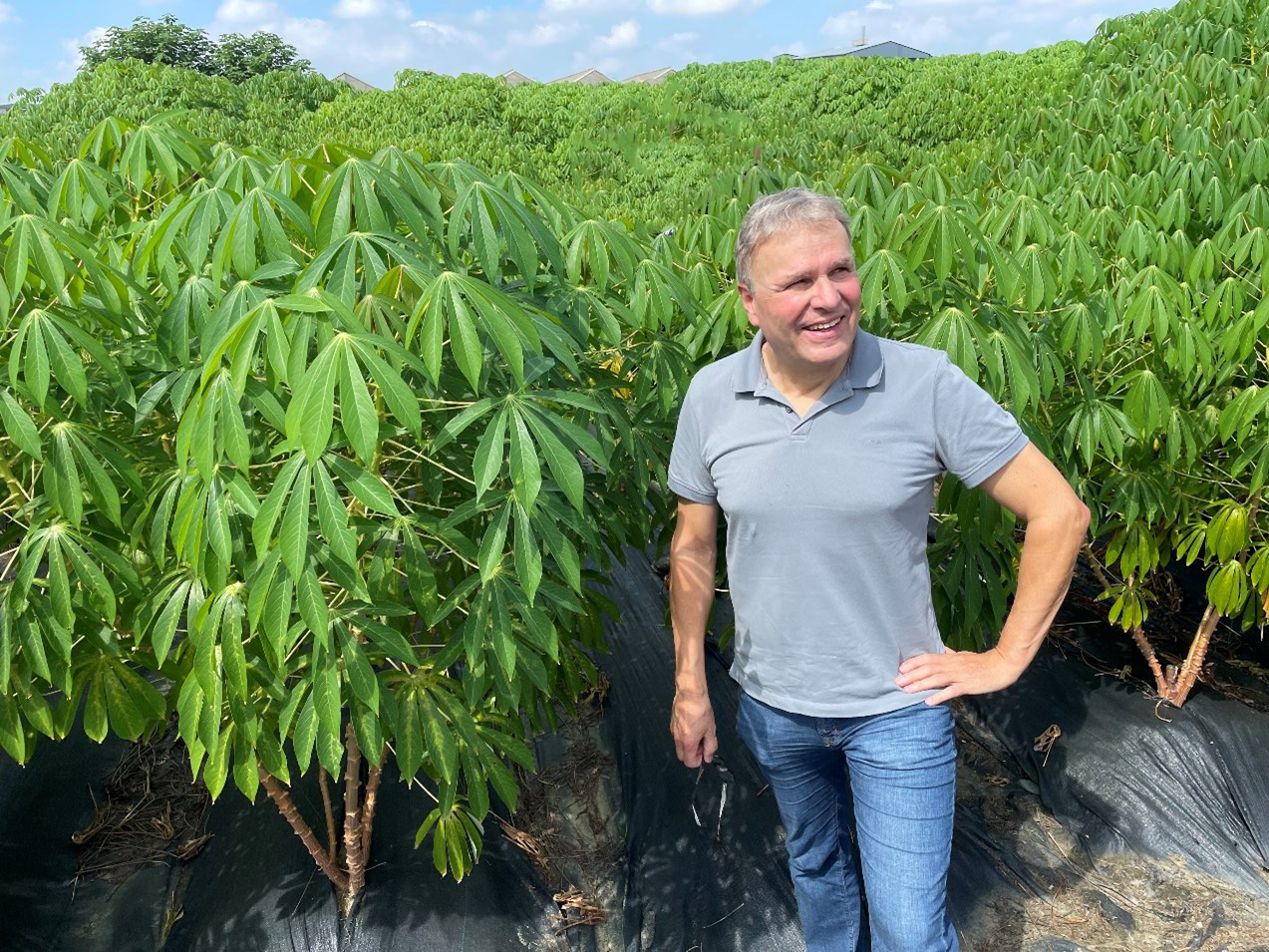

Heat, drought, and high soil salinity: RPTU researchers are equipping crops to withstand the impacts of climate change
Heat, drought, or even unexpected frosts in an unusually warm spring: the impacts of climate change are increasingly affecting agriculture. Researchers and breeders around the world are analyzing what can be done to counteract this. One approach is to genetically modify crops so that they are resistant to drought, high temperatures, and other environmental conditions that are currently changing.
Professor Ekkehard Neuhaus is working intensively on precisely this challenge: “To understand the relationships, we first investigate how plants respond to challenging environmental conditions. These can also be changes due to nutrient availability or light intensity. ”Plants are stationary and cannot “escape a condition,” explains the biologist, providing some background information: “In order to survive, they had to develop strategies to adapt quickly and effectively to their environment.”
Together with his team, Ekkehard Neuhaus is looking in particular at the activity of transport proteins in plant cells. These are proteins that help transport sugar across membranes, for example. “Specifically, we are investigating the transport into and out of the various organelles in plant cells.” Ekkehard Neuhaus explains: “There are different cell organelles in a plant cell. You can think of it like an apartment with different rooms. There is a kitchen, a bathroom, and a study, each of which fulfills specific functions. In a cell, each cell organelle has its own task.” One of his research questions is: Under what environmental conditions do individual transport processes at cell organelles become particularly important?
How do transport proteins work?
This is not an insignificant question, because transport processes are central to all cells: “Approximately 10 to 20 percent of all genes in an organism lead to the production of transport proteins. We want to understand how these proteins work, how they are organized, and what functions they perform in metabolism,” Neuhaus explains. The sugar and energy metabolism is of particular interest to the researchers in his working group: “Sugar is extremely important for plants and accumulates very significantly in plant cells under stressful conditions."
The goal of his research can be summarized simply: “We want to understand how plants can tolerate extreme conditions, in some cases, by changing their transport processes, and how we can use this knowledge to improve crop plants in a more targeted way.”
Sugar beet as model plant: More biomass and higher yields
Neuhaus and his team are working on various crops, “with sugar beet being of particular importance for many years.” They have identified the sugar transport protein in the root cells of sugar beet. Neuhaus: “This transporter is responsible for the accumulation of sucrose, the sugar we need in our households and in food production, in the beet body.”
And: “Sugar beet is grown as an annual crop here, although it is actually a biennial plant.” This means that sugar beet is basically capable of being sown in late summer or fall, germinating, and growing to a certain extent, but the cultivated beet's pronounced sensitivity to frost prevents it from surviving the winter in our latitudes. “If we could reduce the frost sensitivity of sugar beet, we could switch to two-year cultivation, as is common with winter rapeseed or winter cereals, for example, which would give us a decisive advantage in terms of biomass formation, i.e., more sugar. “We are looking at which genes are active or inactive for transport proteins and which sugars appear in the cell organelles." Or to put it simply: the researchers are looking for transport proteins that help improve the plant's cold tolerance. The corresponding crop could then be modified in a more targeted manner so that it has precisely these protective compounds at its disposal.
Traditional breeding methods too slow
Ekkehard Neuhaus sums up that traditional breeding methods are no longer able to keep up with today's requirements. “It takes ten to 15 years for a new plant to come onto the market.” Today, researchers work with selected genes that can be modified in a targeted manner using techniques such as gene scissors. “These modern approaches allow for faster and more targeted breeding.” His work also involves patents that he is developing with his cooperation partners, including a leading international sugar beet seed producer. “More specifically, these are patents for genes that are necessary for the formation of these transport proteins.”
Plants with higher salt tolerance
Neuhaus' team is dealing specifically with the consequences of climate change in another project. A relative of rapeseed is being used as a model plant. “Here, too, we are investigating transport proteins.” What makes this plant special is that it already has a high salt tolerance, so we can learn from it, so to speak. This is because “an increase in the outside temperature, as is currently the case with climate change, also leads to soil salinization, which severely damages plants and reduces yields.” His research question here is: “How can we obtain plants with a higher salt tolerance?”
Mastering biochemical challenges
What is the biggest challenge in his research? “We are working with a specific group of proteins called membrane proteins.” These are hydrophobic, meaning they are not water-soluble. “In order to understand these proteins biochemically, we have to extract them from the membrane and then place them in vesicles so that they remain active.” To do this, the genes that code for these transport proteins are transferred to bacterial or baker's yeast cells so that they can then produce the proteins in sufficient quantities.
Greater stress tolerance with the help of algae protein
Algae protein comes into play in the next step: Chlorella ohadii is an algae system that can tolerate “very stressful environmental conditions, such as extremely high light intensities or very strong temperature fluctuations between day and night.” The aim is to introduce selected proteins from this algae into higher plants to analyze how these changes affect their stress tolerance. This complex approach is made possible by a coordinated research program in which Ekkehard Neuhaus is pooling his expertise with colleagues at RPTU and other plant researchers from across Germany.
Making higher cassava yields possible
But that's not all: together with African, American, Taiwanese, and European partners, Ekkehard Neuhaus is focusing on the crop plant cassava to achieve higher yields. With its starchy tuber, cassava is one of the most important staple foods, especially in the tropics and subtropics. “This project has already resulted in a patented cassava plant that produces higher yields under field conditions.” The necessary field trials are currently being conducted at the University of Taichung in Taiwan, “where thousands of individual transgenic cassava plants are being cultivated in a large field.”
It's impossible without computer science
Plant research has long been interdisciplinary, and computer science is becoming increasingly important: “Our work now also involves evaluating vast amounts of data.” This includes, for example, data from imaging and information on more than 20,000 proteins, just as many genes, and thousands of metabolites. “We investigate what these are, how active they are, and in what quantities they are present in the cells and when.” His university is ideally equipped for precisely such interdisciplinary challenges: “The RPTU is ideal for this type of work; we are simply exceptionally well positioned here.”


FOR A DEEPER DIVE INTO THE TOPIC
Browse through the selection of media reports and scientific publications:
Guo W-J, Pommerrenig B, Neuhaus HE, Keller I (2023) Interaction between sugar transport and plant development. J. Plant Physiol. 288, 154073.
>> GO TO PAPER
Schwenkert S, Fernie AR, Geigenberger P, Leister D, Möhlmann T, Naranjo B, Neuhaus HE (2022) Chloroplasts are key players to cope with light and temperature stress. Trends in Plant Sci. 27, 577-587.
>> READ THE PUBLICATION
Keller I, Martins Rodrigues C, Neuhaus HE, Pommerrenig B (2021) Improved resource allocation and stabilization of yield under abiotic stress. J. Plant Physiol. 257, 153336.
>> VIEW ARTICLE

These topics might also interest you:



